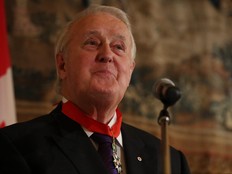Trump backs U.S. Steel, Nippon partnership after national security review

Article content
President Donald Trump backed a partnership between United States Steel Corp. and Japan’s Nippon Steel Corp., crediting his tariff policies for an investment that would keep the iconic American firm in the U.S.
While he stopped short of explicitly endorsing Nippon Steel’s earlier proposed $14.1 billion takeover of U.S. Steel, shares of the American steelmaker surged as much as 26% in late Friday trading — signaling market optimism over the deal’s prospects.
“I am proud to announce that, after much consideration and negotiation, US Steel will REMAIN in America, and keep its Headquarters in the Great City of Pittsburgh,” Trump said on Truth Social on Friday. “My Tariff Policies will ensure that Steel will once again be, forever, MADE IN AMERICA.”
While the White House declined to provide further details, Japanese media including Nikkei and Kyodo News reported that a buyout had been approved, citing U.S. sources they didn’t identify.
Trump said the partnership would create at least 70,000 jobs and add $14 billion to the U.S. economy, with the bulk of the investment occurring in the next 14 months. He also said he would appear at an event on May 30 in Pittsburgh.
About 85,000 people now work in U.S. steel mills, according to the Bureau of Labor Statistics.
The unexpected announcement via social media came shortly after the White House confirmed Trump had received a recommendation from the Committee on Foreign Investment in the U.S., which reviewed the proposed takeover.
Trump had repeatedly said there must be an investment, not an outright ownership as was originally agreed upon by the two companies in 2023. In January, then-President Joe Biden blocked the deal, citing national security concerns.
Advocates for a merger have long argued that Nippon Steel would help revitalize the once-struggling U.S. Steel through significant repairs to aging assets, investment to boost capacity and technology sharing.
However, the deal faced resistance from the influential United Steelworkers union that operates U.S. Steel’s integrated mills across the American Rust Belt. USW President David McCall blasted the deal for failing to get union input, and both Biden and Trump argued during their election battle that U.S. Steel should remain in American hands.
U.S. Steel shares in New York ended the day up 21% at $52.01. The company in December 2023 agreed to sell itself to Nippon Steel for $55 per share in an all-cash deal.
Trump’s announcement also came after Japan’s top trade negotiator, Ryosei Akazawa, met earlier in the day with Commerce Secretary Howard Lutnick in Washington as part of a third round of tariff talks. That followed a phone call between Trump and Prime Minister Shigeru Ishiba, in which they agreed to an in-person meeting in Canada next month at a Group of Seven leaders’ summit.
Japan faces a 25% U.S. levy on cars, steel and aluminum, as well a 10% duty on all goods that’s set to jump to 24% in early July after a 90-day pause lapses if no trade deal is reached.
Japanese carmakers including Toyota Motor Corp. have already reported expected profit losses in the billions of dollars because of the tariffs. Given his economy already contracted last quarter, Ishiba faces the possibility of Japan tipping into a recession if the trade pressures don’t abate.
Akazawa will continue shuttling between capitals into next week, as he’s expected to meet Treasury Secretary Scott Bessent, a key player at the previous two rounds of tariff talks, in Washington on May 30.
Trump’s blessing could bring about a new era for the U.S. steelmaker, which once held the title of the world’s largest company. But Nippon Steel will have to justify to its shareholders why it would keep the aging, less-efficient and higher-cost integrated assets running. USW’s McCall has repeatedly said investments in the mills will make them the most efficient plants in the world, and that they will remain competitive for decades to come.
—With assistance from Shawn Donnan, Meghashyam Mali and Simon Casey.











Postmedia is committed to maintaining a lively but civil forum for discussion. Please keep comments relevant and respectful. Comments may take up to an hour to appear on the site. You will receive an email if there is a reply to your comment, an update to a thread you follow or if a user you follow comments. Visit our Community Guidelines for more information.